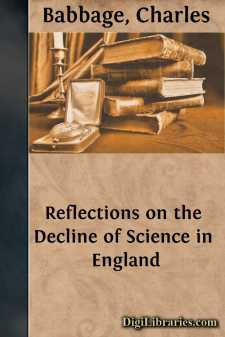Categories
- Antiques & Collectibles 13
- Architecture 36
- Art 48
- Bibles 22
- Biography & Autobiography 813
- Body, Mind & Spirit 142
- Business & Economics 28
- Children's Books 17
- Children's Fiction 14
- Computers 4
- Cooking 94
- Crafts & Hobbies 4
- Drama 346
- Education 46
- Family & Relationships 57
- Fiction 11829
- Games 19
- Gardening 17
- Health & Fitness 34
- History 1377
- House & Home 1
- Humor 147
- Juvenile Fiction 1873
- Juvenile Nonfiction 202
- Language Arts & Disciplines 88
- Law 16
- Literary Collections 686
- Literary Criticism 179
- Mathematics 13
- Medical 41
- Music 40
- Nature 179
- Non-Classifiable 1768
- Performing Arts 7
- Periodicals 1453
- Philosophy 64
- Photography 2
- Poetry 896
- Political Science 203
- Psychology 42
- Reference 154
- Religion 513
- Science 126
- Self-Help 84
- Social Science 81
- Sports & Recreation 34
- Study Aids 3
- Technology & Engineering 59
- Transportation 23
- Travel 463
- True Crime 29
Reflections on the Decline of Science in England
by: Charles Babbage
Description:
Excerpt
CHAPTER I. ON THE RECIPROCAL INFLUENCE OF SCIENCE AND EDUCATION.
That the state of knowledge in any country will exert a directive influence on the general system of instruction adopted in it, is a principle too obvious to require investigation. And it is equally certain that the tastes and pursuits of our manhood will bear on them the traces of the earlier impressions of our education. It is therefore not unreasonable to suppose that some portion of the neglect of science in England, may be attributed to the system of education we pursue. A young man passes from our public schools to the universities, ignorant almost of the elements of every branch of useful knowledge; and at these latter establishments, formed originally for instructing those who are intended for the clerical profession, classical and mathematical pursuits are nearly the sole objects proposed to the student's ambition.
Much has been done at one of our universities during the last fifteen years, to improve the system of study; and I am confident that there is no one connected with that body, who will not do me the justice to believe that, whatever suggestions I may venture to offer, are prompted by the warmest feelings for the honour and the increasing prosperity of its institutions. The ties which connect me with Cambridge are indeed of no ordinary kind.
Taking it then for granted that our system of academical education ought to be adapted to nearly the whole of the aristocracy of the country, I am inclined to believe that whilst the modifications I should propose would not be great innovations on the spirit of our institutions, they would contribute materially to that important object.
It will be readily admitted, that a degree conferred by an university, ought to be a pledge to the public that he who holds it possesses a certain quantity of knowledge. The progress of society has rendered knowledge far more various in its kinds than it used to be; and to meet this variety in the tastes and inclinations of those who come to us for instruction, we have, besides the regular lectures to which all must attend, other sources of information from whence the students may acquire sound and varied knowledge in the numerous lectures on chemistry, geology, botany, history, &c. It is at present a matter of option with the student, which, and how many of these courses he shall attend, and such it should still remain. All that it would be necessary to add would be, that previously to taking his degree, each person should be examined by those Professors, whose lectures he had attended. The pupils should then be arranged in two classes, according to their merits, and the names included in these classes should be printed. I would then propose that no young man, except his name was found amongst the "List of Honours," should be allowed to take his degree, unless he had been placed in the first class of some one at least of the courses given by the professors. But it should still be imperative upon the student to possess such mathematical knowledge as we usually require....


